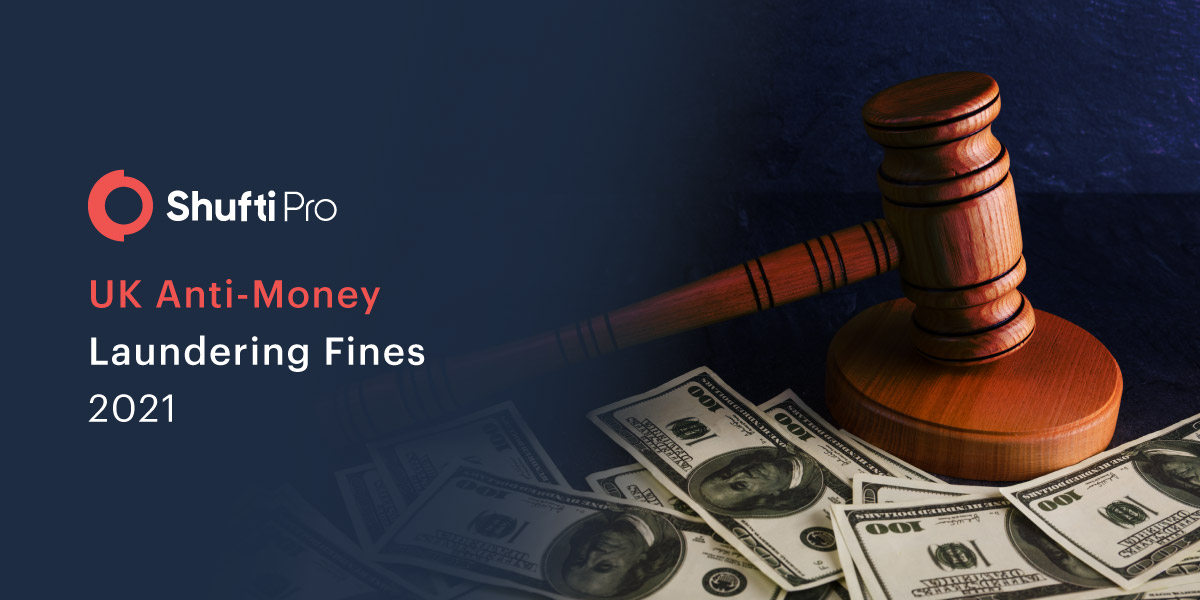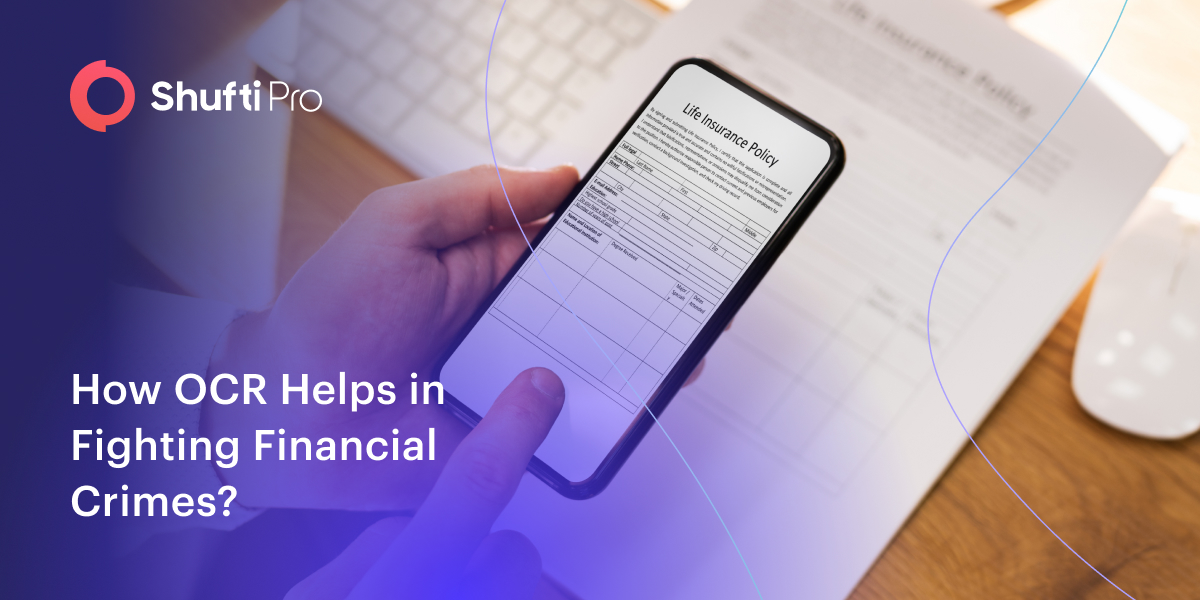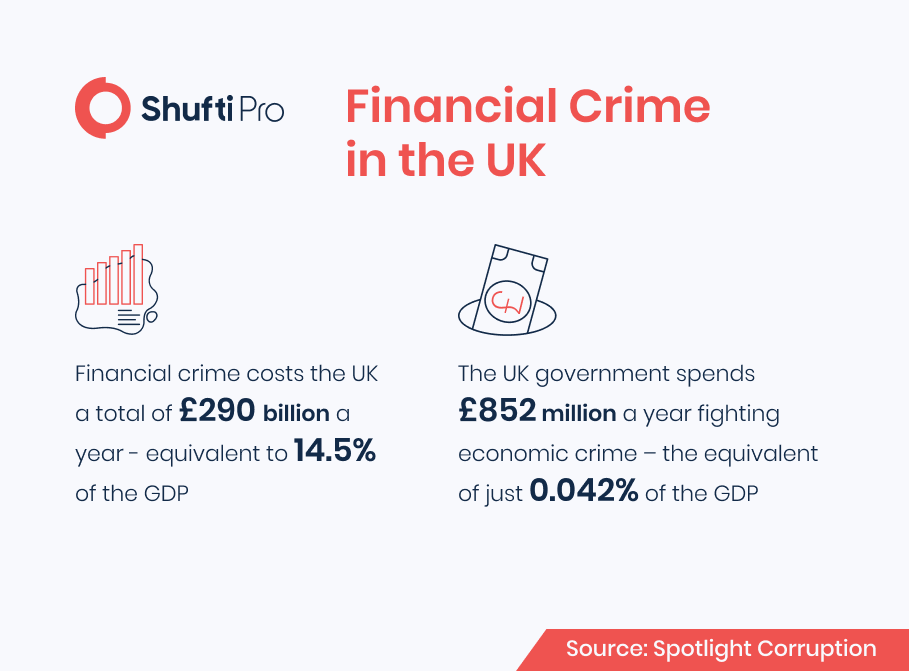Blog
A guide to choosing the right ‘Digital Identity Verification Solution’
Living in the digital era, everything is now just a click away. From customer onboarding to onlin...
 Explore More
Explore More
Blog
Impact of Beneficial Ownership Transparency on Real Estate Crimes
The high price tags of real estate in the US open doors for corrupt politicians, kleptocrats, and...
 Explore More
Explore More
Blog
Biometric Authentication – How Do Fraudsters Try to Bypass These Checks?
Biometric authentication is one of the ideal ways of dealing with fraudsters. Unfortunately, crim...
 Explore More
Explore More
Blog
Top 5 Cryptocurrency Trends to Look Out for in 2023
2022 has been one of the most turbulent years for the cryptocurrency sector. For starters, Bitcoi...
 Explore More
Explore More
Blog
NFT Trading and Money Laundering – How Shufti’s AML Screening Helps Combat Financial Crimes
With revolutionary technologies and growing digitization, the digital version of artworks known a...
 Explore More
Explore More
Blog
Cross-Border KYC Compliance | Understanding and Overcoming the Challenges
To handle money laundering incidents and rising regulatory pressure, the banking industry benefit...
 Explore More
Explore More
Blog
How to Design an Effective Client Lifecycle Management (CLM) System with ID Verification
The customer journey with a business is very comprehensive. It does not end once the customer is ...
 Explore More
Explore More
Blog
Top 5 Most Common Identity Fraud Attempts in 2021
Fraudsters in the post-pandemic world took complete advantage of rapid digitization. Bad actors b...
 Explore More
Explore More
Blog
UK Elections: Photo ID Law Change Raising Concerns for Voters
Law changes bring several hassles for the public and government authorities. The recent photo ID ...
 Explore More
Explore More
Blog
What are chargeback frauds and what do they mean for businesses?
The world we live in no longer seems to be honest and fair. A large number of individuals are par...
 Explore More
Explore More
Blog, Online Marketplace
7 Identity theft protection practices for Business and Recuriters
Identity theft is now no more a cause of concern for the individual users only as corporations an...
 Explore More
Explore More
Blog
Video KYC Onboarding: Fintechs meeting KYC compliance with video identifications
The Financial industry is introducing a digital revolution globally. The term Fintech corresponds...
 Explore More
Explore More
Blog
Intelligent Security Systems & Digital ID Verification
Most technology solutions present a compromise between convenience and security to their users. I...
 Explore More
Explore More
Blog
Biometric Authentication Technology – Everything you Need to Know
Nowadays businesses are looking for more secure systems for the sole reason of customer authentic...
 Explore More
Explore More
Blog, Online Marketplace
Fraud Protection services for Online Retail Businesses
Online Marketplace faces Chargeback issues
Fraud Protection Services are an integral part of reta...
 Explore More
Explore More
Blog
5 Ways How AI Is Uprooting Recruitment Industry
Artificial Intelligence is strengthening its position in many industries and the recruitment indu...
 Explore More
Explore More
Blog
A Detailed Insight into Due Diligence for SMEs in Europe
Recent developments in due diligence legislations have prompted debate on SMEs being subject to t...
 Explore More
Explore More
Blog
Transaction Monitoring: Going Beyond AML Screening
Whether you are an accountant in Wall Street or a developer for Google, money laundering will not...
 Explore More
Explore More
Blog
KYCC – Going an Extra Mile to Prevent Financial Crimes
As cases of money laundering and terror financing are increasing globally, the concerns to overco...
 Explore More
Explore More
Blog, Financial Crime / AML
What is PEP Compliance and Why do Financial Institutions Need it?
For Politically Exposed Persons (PEPs), an inter-governmental body established in 1989, Financial...
 Explore More
Explore More
Blog
Identity checks – A Profitable Business Strategy or Another Business Expense?
Online commerce is a necessity of every business these days. With nearly every consumer carrying ...
 Explore More
Explore More
Blog, Fraud Prevention
Identity Theft – One Fraud Multiple Facets
Identity theft is a global crime. All types of identities, including the financial, medical and b...
 Explore More
Explore More
Blog, Financial Crime / AML
Impact of Canada’s Evolving AML Regimes on Your Business
Canada’s AML regulations changed a lot in 2019. More rigid AML regulations are imposed on all typ...
 Explore More
Explore More
Blog
Top 7 Gambling Trends to Look Out for in 2023
Going from a few billion dollars to over $81 bn in a matter of a decade is astronomical for any i...
 Explore More
Explore More
Blog
Address Verification: The Cornerstone of Elevating Customer Experience
Today’s highly emerging technology is changing the way consumers shop online products. Given the ...
 Explore More
Explore More
Blog
Halloween Scams – Watching Out for Tricks, Identity Fraud, and Financial Crime
Halloween is one of the most awaited and celebrated events in a large number of countries across ...
 Explore More
Explore More
Blog
Risk Assessment – Helping Businesses Determine High-Risk Customers
The 2008 financial crash was a pivotal event in shedding light on the detrimental impact of lacki...
 Explore More
Explore More
Blog
Enhanced Digital Security with Facial Recognition and Liveness detection
The increasing number of cyber-attacks and online fraud calls out for strong security measures. U...
 Explore More
Explore More
Blog, Online Marketplace
12 Ways Identity Verification Services Helping Online Businesses
The online marketplace has a culminating presence in the business world. Worldwide e-commerce sal...
 Explore More
Explore More
Blog
The Reality Behind Money Laundering through Environmental Crimes
Environmental crimes are among the most prevailing and profiting offenses present in the world. C...
 Explore More
Explore More
Blog, Financial Crime / AML, Fraud Prevention, Identity & KYC
Data Breaches – Types, Sources, and Preventive Measures
A large number of well-renowned companies are under the threat of high-scale data breaches. After...
 Explore More
Explore More
Blog
AUSTRAC’s ML/TF Risk Assessment Report on Foreign Bank Branches [Part 3]
This blog makes the third chapter of our four-part series on AUSTRAC’s report on the Banking Sect...
![AUSTRAC’s ML/TF Risk Assessment Report on Foreign Bank Branches [Part 3] AUSTRAC’s ML/TF Risk Assessment Report on Foreign Bank Branches [Part 3]](https://shuftipro.com/wp-content/uploads/image-17-2.png) Explore More
Explore More
Blog
The Relentless Rise of Fraud in the FinTech Industry – How CDD Helps
Fraud has always been on the rise ever since the advent of the FinTech industry. As perpetrators ...
 Explore More
Explore More
Blog
COVID Verification of Tourists: Is the Hospitality Sector Doing Much?
COVID-19 has been a big hassle for everyone except for those who adopted the new normal quickly. ...
 Explore More
Explore More
Blog
Biometric Facial Recognition – Combating Identity Fraud with Shufti’s IDV Solution
Since knowledge-based authentication and passwords were first introduced, security systems in ban...
 Explore More
Explore More
Blog, Business Technology
Biometric Verification – Shaping the Future of Payments
Today’s world is no longer different from the science fiction world. With the advent of technolog...
 Explore More
Explore More
Blog
Know Your Patient – Eliminating Fraud and Crime in the Healthcare Sector
The digital transformation has reached the healthcare sector with new remote onboarding options f...
 Explore More
Explore More
Blog
International Tax Body to curb Cryptocurrency based Tax Evasion
Tax enforcement authorities from Australia, Canada, the Netherlands, the United Kingdom and the U...
 Explore More
Explore More
Blog
AML Compliance for Luxury Goods Market – How Shufti can Help
Money laundering using high-value goods such as jewelry, yachts, motor vehicles, watches, fine ar...
 Explore More
Explore More
Blog
Avoid Non-Compliance Fines with AML Transaction Monitoring
Cybercriminals in the realm of fraud and financial crime are constantly revising exploitation met...
 Explore More
Explore More
Blog
Safeguarding Telecommunication Industry with Robust ID Verification Solutions – What Shufti Offers
Technology transformation, growing transactions and global digitisation are increasing the potent...
 Explore More
Explore More
Blog
UK Watchdogs Hit Financial Institutions with Record AML Fines in 2021
A dramatic increase in Anti-Money Laundering (AML) fines was seen in 2021 as financial watchdogs ...
 Explore More
Explore More
Blog
Impact of Beneficial Ownership Transparency on Real Estate Crimes
The high price tags of real estate in the US open doors for corrupt politicians, kleptocrats, and...
 Explore More
Explore More
Blog, Identity & KYC
Why You Need to Verify Identity Online
5 Unusual Ways Stolen Identities Can be Used Online
The need to verify identity in the digital sp...
 Explore More
Explore More
Blog, Fraud Prevention
Data Breaches in 2019 – A Year in Review
Stepping into 2020, the year 2019 has been on the rollercoaster in terms of security breaches. Da...
 Explore More
Explore More
Blog
Gaming Industry Crimes and KYC/AML Solutions – What Shufti Can Offer
From the world’s glitziest gaming development to betting shops on the high streets, the global ga...
 Explore More
Explore More
Blog
A 2024 Overview of Identity Document Forgery
As technologies like artificial intelligence and machine learning have advanced, they have signif...
 Explore More
Explore More
Blog
A Comprehensive Guide to AML Compliance [2020]
Anti-money laundering (AML) laws are the primary target of regulatory authorities. These regimes ...
![A Comprehensive Guide to AML Compliance [2020] A Comprehensive Guide to AML Compliance [2020]](https://shuftipro.com/wp-content/uploads/AML-Compliance-2.jpg) Explore More
Explore More
Blog
The Evolution of Video KYC: Revolutionise the Fintech Industry
FinTech encompasses financial organisations’ use of computing and communications tools to b...
 Explore More
Explore More
Blog, Online Marketplace
The Urgency for Know Your Customer’s Customer (KYCC) in Businesses
It is not just the financial services sector that is required to comply with anti-money launderin...
 Explore More
Explore More
Blog
5 Features of the Best Transaction Monitoring Solution
Criminals are continuously devising sophisticated strategies to launder illegally-acquired money....
 Explore More
Explore More
Blog
GDPR Compliance vs BlockChain Debate – Things you must know
GDPR Compliance is here to stay and it is going to be binding on every business and online enterp...
 Explore More
Explore More
Blog
Know Your Donor (KYD) – Eradicating Financial Crimes in NPOs and Charity Organizations
In 2020, US citizens alone donated more than $471 billion to charities. This generosity ultimatel...
 Explore More
Explore More
Blog
Top 5 Cybersecurity Trends to Look Out for in 2022
With 2022 just around the corner, new developments in cybersecurity are already beginning to take...
 Explore More
Explore More
Blog
Fighting Prevailing Crimes in Gaming Industry with Shufti’s Anti-Money Laundering Screening Solution
Modern gaming is the most recent evolution of this industry that has become the attraction of glo...
 Explore More
Explore More
Blog
A guide to choosing the right ‘Digital Identity Verification Solution’
Living in the digital era, everything is now just a click away. From customer onboarding to onlin...
 Explore More
Explore More
Blog
Top 10 Identity Verification Trends to Look Out for in 2022
Did you know identity fraud is growing at a faster than ever rate? Businesses across the globe ar...
 Explore More
Explore More
Blog
A Detailed Insight Into Australia’s Gaming and Gambling Regulations
In recent years, the online gaming and gambling industry has experienced significant growth as te...
 Explore More
Explore More
Blog
A Brief Insight into Netherlands’ Cryptocurrency Regulations
Just like other European countries, the Netherlands is also a notable financial center making it ...
 Explore More
Explore More
Blog
A Basic Guide to Know Your Customer Online (2023 Update)
In our current digital landscape, where identity theft seems rampant, protecting personal informa...
 Explore More
Explore More
Blog
5 Key Questions About KYC Compliance to Look Out for in 2021
With the COVID-19 pandemic bringing challenges every day for businesses, the rate of identity fra...
 Explore More
Explore More
Blog
How OCR Helps in Fighting Financial Crimes?
OCR, also known as Optical Character Recognition, isn’t a new technology. However, it’s use in fi...
 Explore More
Explore More
Blog
NFC – Building New Grounds for Identity Verification
Near Field Communication (NFC) is based on the famous RFID technology. In 2002, Nokia was the fir...
 Explore More
Explore More
Artificial Intelligence, Blog, Fraud Prevention
The Role of Artificial Intelligence in the Future Of Financial Fraud Detection
Until a few years ago Artificial Intelligence seemed like a thing from sci-fi movies. The whole c...
 Explore More
Explore More
Blog
Identity Document Verification | Revolutionising Customer Onboarding
Companies worldwide are undergoing a radical digital transition to keep up with today’s lig...
 Explore More
Explore More
Blog
Identity verification in social media – Lighting up the dark side
Social media is a word every one of us can relate to. With every passing day, it is penetrating i...
 Explore More
Explore More
Blog
Crypto Regulations 2021 – What Digital Currency Providers Need to do
Cryptocurrency has been a hot topic ever since its advent in 2009. The ability to draw investor a...
 Explore More
Explore More
Blog
Identification, Verification and Authentication – Cut from the same cloth
The modern era of technology has brought so many frauds to light. The digitized world has urged b...
 Explore More
Explore More
Blog
Global KYC and AML Regulatory Updates To Watch for in 2022
In 2022, the world continues to experience the serious aftermath of the coronavirus pandemic, yet...
 Explore More
Explore More
Blog
The 10 Biggest DeFi Hacks of 2022 and How Can KYC/AML Compliance Help
The crypto industry witnessed a challenging year in 2022, marked by numerous hacks and scams, hig...
 Explore More
Explore More
Blog
Understanding eKYC | The Benefits, Processes & 2024 Forecast
Governments worldwide require firms, such as financial institutions, to know who their customers ...
 Explore More
Explore More





































![AUSTRAC’s ML/TF Risk Assessment Report on Foreign Bank Branches [Part 3] AUSTRAC’s ML/TF Risk Assessment Report on Foreign Bank Branches [Part 3]](https://shuftipro.com/wp-content/uploads/image-17-2.png)














![A Comprehensive Guide to AML Compliance [2020] A Comprehensive Guide to AML Compliance [2020]](https://shuftipro.com/wp-content/uploads/AML-Compliance-2.jpg)






















